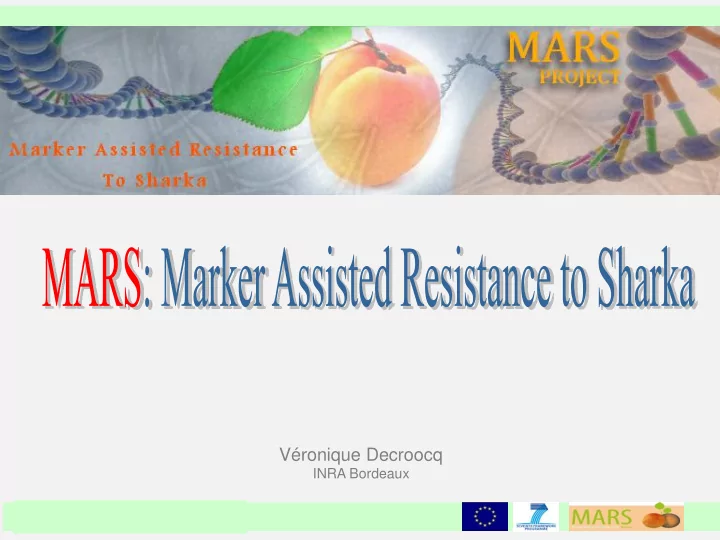

Véronique Decroocq INRA Bordeaux
The sharka disease, a major phytosanitary problem in stone fruit production Plum, peach, apricot, cherry, almond Due to Plum Pox Virus (PPV) infection, a quarantine pathogen Transmissible by aphids and grafting Major socio-economic impact, especially in Eastern and Southern EU impoverished regions
The routes to sharka dissemination Grafting NURSERIES ORCHARDS Aphids
Sharka propagation EU- and world-wide
Sharka propagation EU- and world-wide Bulgaria 1917-1918 North America 1999 (PPV-D) Japan 2009 China 2004 Chile 1993 India 1994 (PPV-D) Egypt 1988
Impact of sharka on fruit production NURSERIES ORCHARDS Loss of phytosanitary passport for three Infected trees are eliminated. consecutive years, at least. Sale and production If more than 10% of the of Stone fruit plants are completely forbidden. orchard is infected, the field is removed. Disease management EU-wide 10 billions € / 30 y Loss in apricot production 3.5 billions € EU entire regions of apricot or peach production dropped cultivation because of heavy sharka infection (Spain -Valenciano-, Greece – Peloponese-, Austria … )
Methods of sharka containment Plantation of healthy material (certified virus-free) Control of aphids (but not efficient in the case of sharka) Eradication of any PPV infected wild or cultivated trees around nurseries and orchards Development of sharka resistant varieties
Methods of sharka containment Development of sharka resistant varieties No peach genitor resistant to sharka Susceptibility Resistance Prunus davidiana Prunus dulcis (almond) One single source of resistance in plum Susceptibility Hypersensitivity ‘Jojo’ Few Apricot genitors of the same genetic origin Susceptibility Tolerance Partial resistance Resistance Immunity ‘SEO’ ‘Harcot’ ‘ Goldrich ’ ‘Stella’ ‘Henderson’ ‘Harlayne’ ‘NJA2’
From SharCo to MARS SharCo for Sharka Containement (2008-2012): Three main research focus 1) Epidemiology 2) Genetic 3) Guidelines for disease management Highthroughput selection of PPV resistant, new apricot cultivars, adapted to the EU-wide cultivation requirement (from North to South, from West to East) Transfer of the technology and the plant material to SMEs MARS for Marker Assisted Resistance to Sharka (2013-2015)
MARS: For EU-wide MAS of PPV resistant apricot (2013-2015) 17 partners : 9 public institutions INRA (France) UMIL (Italy) UNIBO (Italy) USAMV (Romania) FGI (Bulgaria) MKU (Turkey) NAGREF (Greece) CEBAS-CSIC (Spain) Mendelu Univ (Czech rep) 8 private partners Poland ADNid (France) Germany Beta Company (Turkey) Czech R Food Allergens (Greece) Slovakia Romania France CEP Innovation (France) C.R.P.V (Italy) Serbia Bulgaria Juglans regia (Bulgaria) Italy EFE VIVEROS del Sureste (Spain) Spain Phytoria Karayiannis (Greece) Turkey
Expected results of MARS: Marker Assisted Resistance to Sharka • To provide highly competitive trees AND molecular tools for breeding for resistance to PPV and ensuring the safe production of stone fruits • To transfer knowledge and technologies to SMEs in order to speed up in Europe the selection of innovative plant material resistant to Plum pox virus
MARS activities and achievements The Marker Assisted Selection technology : Legacy of the SharCo FP7 project Filippo Geuna and Daniele Bassi (UNIMIL) The MARS outcomes for the apricot fruit industry Fabienne Moreau (ADNid) and Manuel Rubio (CEBAS-CSIC)
Recommend
More recommend